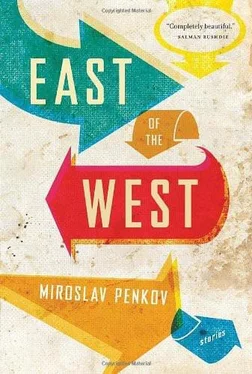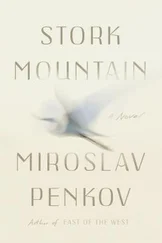“I can’t believe you’re telling us now,” my father said.
“I didn’t want to jinx it,” I told him, which was the truth. “You know my luck.”
“Where is she from, again?” my mother asked, and I told her.
“At least she isn’t black,” my mother said.
In the afternoon I took Yuki to the river. We waded in the water, which was still cold, then sat on the rocks and watched some village children splash in a shallow pool below us. There were a good twenty of them, and their bicycles, parked side by side up where the road was, shone with the sun. Another car whizzed madly by and blew its horn and down below the children yelled and waved as if the car could see them.
“I’ll jump in with them,” I said.
“No you won’t.”
I took my shirt and pants off and walked down to the pool and jumped in. The water was cold and I screamed and up above Yuki laughed and made her beloved peace sign.
“That’s some cold water,” I told the children.
“No it’s not. Just keep moving,” they said. We splashed around. They climbed on my shoulders, muddy feet, and held me by the neck and hair and by my ears. “My ears!” I cried, and up above Yuki laughed again. I could see she was getting ready for a picture. She stood up on the cliff and leaned forward.
“Stop!” I yelled. I rushed out of the pool and scrambled up the rocks.
“What’s the matter with you?” she said.
“You scared me. Don’t lean forward like that.”
“Psycho,” she said. She kissed me. I kissed her on the belly. We watched the footsteps I’d left on the rocks dry up, then I got dressed and we walked back to the house. I asked her if she wanted to see something historic. I led her to the barn and I shoveled very dry hay away from a corner. There was an old wooden gate under the hay, with big runny letters painted on the wood.
“What does it say?” Yuki asked me.
I knew the gate from my father because Grandpa never spoke of such things. On the morning of September 9, 1944, a bunch of beardless boys, fresh out of the woods after months of hiding in dugouts, knocked on my great-grandfather’s gate. They informed him that all his stock, fifty cows, one hundred sheep, and his land — three hundred decares — were now property of the Communist Party and would be added to a collective farm. It was the Communist Party, they said, that had taken over and now governed Bulgaria.
My great-grandfather asked to be excused for a moment and returned with his shotgun. How things unfolded exactly I don’t know in detail, but he ended up shooting one of the boys dead. Three days later the comrades returned, summoned an improvised people’s court, declared my great-grandfather an enemy of the people and hanged him on the lower branch of the walnut tree. They made Grandpa, then in his twenties, watch and draw conclusions about his own future. The comrades wrote KULAK on the gates in big tarry letters so everyone who passed by would know our family was a class enemy.
When I was twelve Father brought me to the barn and showed me the gates, which Grandpa had taken off the hinges and preserved hidden under the hay. I remember I didn’t feel anything special reading the letters, with the tar running at their base like green onions that had sprouted roots. But now, with Yuki by my side, I felt something I could not explain, something that, suddenly, I did not want to be passed on to her.
“I don’t know what it says,” I told her.
“You are a psycho,” she said.
•
I was all out of ideas for the rest of the afternoon, so Yuki asked if she could drive the Moskvich. I saw no reason against it. I took her photo by the car, then one of her inside as she waved out a window eternally doomed to open only halfway.
“Maybe we could drive to the Gypsies,” she said.
Instead, I told her to drive up the road, out of the village. She shifted the gears clumsily at first, the teeth grinding as she shifted, but she got into a rhythm soon.
“This isn’t nearly as bad as I expected,” she said, and I told her the engine of the Moskvich was a copy of a BMW engine, so it was, in reality, a BMW we drove.
“It feels more like the Flintstones’ car.”
“The Flintstones? Really, Yuki? That’s your best joke?”
The road wound around the mountain, with a thick pine forest on one side and down below us the gorge where the river flowed. When we passed by the children’s bicycles, Yuki blew the horn. We drove for about four kilometers and I told her to pull over where the road broadened, where a huge concrete pipe stuck out and, when it rained, dumped water from the hills down into the gorge.
We leaned on the hood and watched the pine trees on all sides, the mountain hills on fire with the setting sun. I remembered how Grandma would take me mushroom hunting after every major rain, how once we filled two sacks so large we barely managed to haul them home, fueled, I suppose, only by the exhilarating prospects of all the jars we’d can for the winter. But at home we discovered the mushrooms had drowned in their own blue milk, poisonous doubles of edible mushrooms not even the neighbors’ goats would eat.
I wanted to share this memory with Yuki, but I did not know the names of the edible mushrooms in English, nor of their poisonous doubles.
“Why do we live in America?” I asked her instead. “Can you tell me that? If it’s for the money, we make no money. We have other places to go. We could move back here.”
“I don’t know,” Yuki said. “I don’t see myself living here. There is nothing for me to do here.”
“This is a good place to raise a child,” I said.
“Maybe.”
I looked at her. I said, “Don’t say such things unless you mean them.”
“Let’s see how things go next month,” she said. “Let’s not talk about it now. Let’s not jinx it.” She popped a piece of nicotine gum and chewed it quietly. “It’s like I don’t really need this stuff anymore. I’m fine without it.”
“Good things, Yuki,” I reminded her. We got in the car and she drove back to the village, the gears grating as she shifted.
“Go neutral down the hill. It’s the Bulgarian way. Save gas.”
She flicked the stick in neutral and we moved faster, without the rattle. I held her hand. I felt really good about our situation. “I feel good about our situation,” I said.
“Me too,” she said, and turned to look at me.
The boy, too, must have been riding his bike without looking. But Yuki saw him when we were still a good distance away. She jerked the steering wheel and slammed on the brakes. The tires locked and we slid with a screech, off the road and into the ditch. We hit a rock, but it wasn’t a bad hit. Yuki was okay, and I was okay. We looked at each other to make sure. She turned off the engine and we got out.
The boy lay on one side of the road with his bicycle a few feet away in the grass. He was a tiny boy, dark-haired, dark-skinned. He couldn’t have been older than ten.
“Oh, my God,” Yuki said, and started crying. But the boy sat up and rubbed his head.
“I’m all right,” he said, and looked at me and then at Yuki. She kneeled down and kissed him on the cheeks, on the forehead, she smothered him with kisses.
“Get away from him,” I said, “don’t touch him.”
“You’re very pretty,” the boy told her. He rubbed his head.
I told him to stay as he was, then I told Yuki to go back to the car. She had stopped kissing him but refused to go. She no longer cried. She watched the boy.
“Are you really all right?” I said.
“Yes, baté , I’m fine.”
“Did you hit your head?”
“Maybe. But it doesn’t hurt.”
“How are your arms? Anything broken?”
Читать дальше











